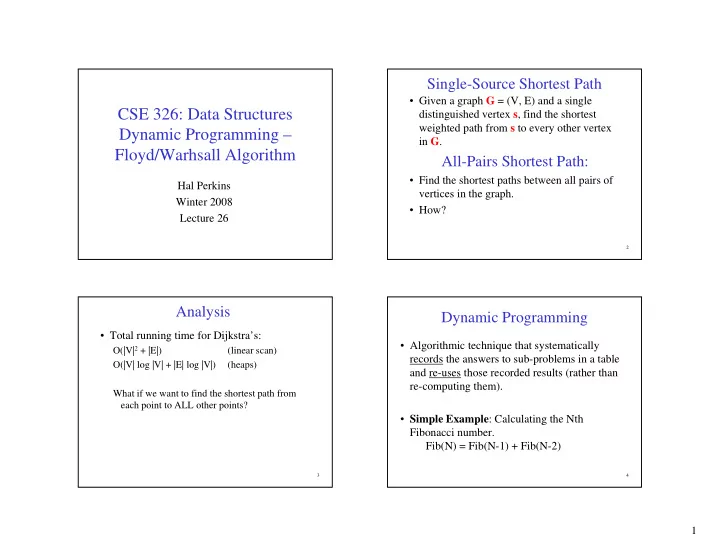

Single-Source Shortest Path • Given a graph G = (V, E) and a single CSE 326: Data Structures distinguished vertex s , find the shortest weighted path from s to every other vertex g p y Dynamic Programming – Dynamic Programming in G . Floyd/Warhsall Algorithm All-Pairs Shortest Path: • Find the shortest paths between all pairs of Hal Perkins vertices in the graph vertices in the graph. Winter 2008 • How? Lecture 26 2 Analysis Dynamic Programming • Total running time for Dijkstra’s: • Algorithmic technique that systematically O(|V| 2 + |E|) (linear scan) records the answers to sub-problems in a table records the answers to sub-problems in a table O(|V| log |V| + |E| log |V|) (heaps) and re-uses those recorded results (rather than re-computing them). What if we want to find the shortest path from each point to ALL other points? • Simple Example : Calculating the Nth g p p Fibonacci number. Fib(N) = Fib(N-1) + Fib(N-2) 3 4 1
Dynamic Programming & Floyd-Warshall Shortest Paths – Floyd-Warshall • Given a directed graph G = (V, E) with no • Data structure: M[x][y] contains the shortest negative-weight cycles (negative-weight edges negative-weight cycles (negative-weight edges known path from x to y Initially this is just the known path from x to y. Initially this is just the may be present), calculate the shortest paths adjacency matrix for the graph between all pairs of vertices • This version only shows the computation of the • Idea: For each pair of verticies vi, vj, find final path lengths – need additional shortest path from vi to vj that only passes bookkeeping to actually remember the paths through {v1, v2, …, vk } – Initially k=1. At each step, increase k by 1. Re- examine each pair vi, vj and see if using vk gives a shorter path than any discovered so far 5 6 b 2 a Floyd-Warshall -2 Initial state of the 1 c -4 3 matrix: • Algorithm 1 d d for (int k = 1; k =< V; k++) for (int k = 1; k =< V; k++) e a b c d e 4 for (int i = 1; i =< V; i++) a 0 2 - -4 - for (int j = 1; j =< V; j++) if ( ( M[i][k]+ M[k][j] ) < M[i][j] ) b - 0 -2 1 3 M[i][j] = M[i][k]+ M[k][j] c - - 0 - 1 d - - - 0 4 Invariant: After the kth iteration, the matrix includes the shortest paths for all e - - - - 0 pairs of vertices (i,j) containing only vertices 1..k as intermediate vertices M[i][j] = min(M[i][j], M[i][k]+ M[k][j]) 7 8 2
2 b a Floyd-Warshall -2 Floyd-Warshall - 1 for All-pairs c -4 3 • Algorithm shortest path 1 for (int k = 1; k =< V; k++) d d e for (int i = 1; i =< V; i++) 4 for (int j = 1; j =< V; j++) a b c d e if ( ( M[i][k]+ M[k][j] ) < M[i][j] ) a 0 2 0 -4 0 M[i][j] = M[i][k]+ M[k][j] b - 0 -2 1 -1 Final Matrix • Total cost: Contents C t t c - - 0 - 1 • Compared to running Dijkstra’s |V| times? d - - - 0 4 e - - - - 0 9 10 3
Recommend
More recommend